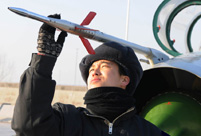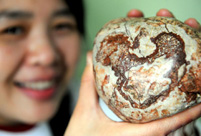 Int'l Snow Sculpture Art Expo in Harbin
Int'l Snow Sculpture Art Expo in Harbin Sichuan money wall for dividend payment
Sichuan money wall for dividend payment Li Na crashes Belinda Bencic in 2nd round at Australian Open
Li Na crashes Belinda Bencic in 2nd round at Australian Open
 Shocking moments when PLA's weapons open fire
Shocking moments when PLA's weapons open fire Famous Lanzhou beef noodles
Famous Lanzhou beef noodles Armed Police hold anti-terrorism drill in SE China's Xiamen
Armed Police hold anti-terrorism drill in SE China's Xiamen Harbin Int'l Ice and Snow Festival opens
Harbin Int'l Ice and Snow Festival opens 'Jin' named the word of the year by cross-strait netizens
'Jin' named the word of the year by cross-strait netizens Chinese scientific expedition goes to build new Antarctica station
Chinese scientific expedition goes to build new Antarctica station
BEIJING, Jan. 22 -- Arable land contaminated by heavy metals across China will be withdrawn from agricultural production, said a senior Chinese agricultural official on Wednesday.
Agricultural land with high levels of heavy metals will no longer be used, said Chen Xiwen, deputy director of the central agricultural work leading team, the top agriculture authority.
Farm land near river sources, especially drinking water sources, will also retreat from production if use of fertilizers and pesticides may cause pollution, he added.
China will start pilot restoration of contaminated farmland this year, according to "No.1 Central Document", the first policy document of 2014, issued on Sunday.
A comprehensive plan to address prominent agricultural and environmental obstructions to sustainable development is also in the pipeline.
The "No.1 Central Document" stressed improvement to the national food security system. In recent years, excessive use of fertilizer, pesticides and plastic film combined with industrial heavy metal and chemical pollution, have hindered the sustainable development of agriculture, said Zheng Fengtian, an agriculture professor at Renmin University of China.
Excessive and improper use of resources has also affected food safety, he added.
China has an estimated 50 million mu (3.3 million hectares) of moderately or severely polluted soil, most of which is in developed and grain-producing regions, said Wang Shiyuan, vice minister of land and resources in December.
The polluted areas account for about 2 percent of total arable land which stands at some 2 billion mu.
Every year, some 12 million tonnes of grain are polluted by heavy metals in the country, according to the Environmental Protection Ministry.
China ranks first globally in total fertilizer use, and use of chemical pesticides is much higher than the world average. With a population of 1.3 billion, China has a great interest in food security and safety.
Grain output was a record high at over 600 million tonnes last year. Around 90 percent of the grain was rice, wheat and corn. However, agricultural development cannot be at a cost to the interests of future generations, said Zheng.
On the one hand, supplies of agricultural produce must be guaranteed. On the other, the quality of agricultural products should also be ensured, according to Zheng.
In the past few years, a number of heavy metal contamination incidents have been reported across China. In May last year, excessive amounts of cadmium, a carcinogen, was detected in rice products in southern Guangzhou city. Most of the toxic rice came from central Hunan Province.
Due to lax supervision and poor management, river pollution by industrial waste is common. In some rural areas, farmers irrigate their crops with water polluted by untreated waste discharged from plants. The treatment of seriously polluted land needs a lot of time, investment and technology.
China invested 9.7 billion yuan (1.6 billion U.S. dollars) in the past three years to tackle heavy metal pollution and closed more than 1,000 factories, Wu Xiaoqing, vice minister of environmental protection, said in March last year.
Some traditional farming methods, such as the use of organic fertilizers, can be promoted for sustainable development, said Zhang Hongsong, an agricultural expert in Chongqing.
Agricultural production standards in use of fertilizers and farming models can also be imposed for rehabilitation of land. The areas of farmland in need of rehabilitation occupy just a tiny part of the total arable land, and will not affect output or prices, said Zheng.
 Su-30 fighter formation taking off for training
Su-30 fighter formation taking off for training  Xuelong carries on mission after breaking from floes
Xuelong carries on mission after breaking from floes Charity exhibition raises money for panda protection
Charity exhibition raises money for panda protection 'Map of China' on the stone
'Map of China' on the stone  Chinese naval escort taskforce repels 4 suspicious vessels
Chinese naval escort taskforce repels 4 suspicious vessels World's weekly photos (1.6-1.12)
World's weekly photos (1.6-1.12) Li Na crashes Belinda Bencic in 2nd round at Australian Open
Li Na crashes Belinda Bencic in 2nd round at Australian Open Weekly sports photos
Weekly sports photos China's national pole dancing to play 'The Butterfly Love'
China's national pole dancing to play 'The Butterfly Love'  The never-ending Silk Road
The never-ending Silk Road  Spring Festival travel rush: One window, one world
Spring Festival travel rush: One window, one world Int'l Snow Sculpture Art Expo in Harbin
Int'l Snow Sculpture Art Expo in Harbin China photographs internal structure of water molecule
China photographs internal structure of water molecule 'Predator' makes proposal to girlfriend
'Predator' makes proposal to girlfriend Thousands of fish frozen on Norway sea
Thousands of fish frozen on Norway seaDay|Week|Month